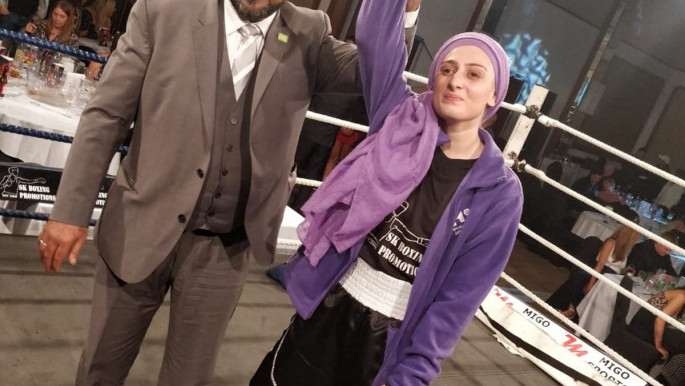Sannah Hussain: Disabled Muslim boxer fights against discrimination
Sannah first came across boxing when the charity she worked at launched a ladies only boxing class to promote female empowerment as well as positive health within the Glasgow Asian and Muslim Community.
As the female representative of the charity at the time it became Sannah's job to promote and manage the operational side of the class.
"It felt right to take part and I realised very early on that I not only enjoyed it but I was good at," Sannah tells The New Arab. "It was after that I started taking additional classes throughout the week."
Sannah goes on to add that she has always been an active and sporty person regardless of how her health limits it.
"I was never good at team sports as I couldn't keep up with others or in many cases see well enough to take part. But boxing in its very nature is a lonely sport where you have to rely on yourself," she adds.
This made it easy for Sannah to enjoy it more than other sports as she does not have to feel guilty about letting other people down or sad that she was not progressing as fast as her teammates.
During her six weeks of intensive training prior to the boxing match she covered everything from boxing technique, stamina, muscle strengthening and general fitness.
"My trainer knew that I was visually impaired and had a muscle weakening disease. Initially over email, I was told that I would not be able to fight," Sannah reveals.
"But I made the effort to meet him in person and convince him that I was motivated enough to do it. We came to an agreement that I could take part in the training but if at any point he thought I wasn't ready then I would have to accept his decision and not fight."
 |
|
| Sannah has Myasthenia Gravis, a chronic autoimmune neuromuscular disease |
For safety reasons Sannah had to have a medical examination with the doctor beforehand which she passed but was warned to listen to her body and stop if she needed to.
Sannah says she vividly remembers the doctor saying "just remember, with MG the aim should be to live a normal life".
"I said yes, but in my head I thought to myself who wants to live a normal life?"
Her fight did not include head shots and the rounds were shortened as it was an exhibition fight to introduce Sannah to the boxing ring.
The world, in Sannah's view is extremely uneducated about disabilities and many people don't see the need to be concerned about it, she says. But Sannah still believes that the world is unpredictable.
"You never know what may happen tomorrow and how your life may change," she adds. "More people need to be open-minded to making special adjustments so that every day places and sports are more accessible. We don't all fit into nice and easy understandable boxes."
Sannah's main struggle is simply finding others who are like her in the sense of being a Muslim female with a disability so that she could share experiences and better understand her own shortcomings.
There are of course many females that she has come across who have a disability, but as she tells us "often people forget that our culture has a big part to play in the challenges we face."
"The attitude unfortunately towards disability in the Muslim community or at least the community I grew up in is very different and somewhat negative," Sannah says, adding that she wished people were not so "afraid" of disabilities.
The hardest part about living with a disability Sannah feels is trying to decide how much emphasis one should place on it.
Whether your disability directly impacts your mental health or not, living with an illness requires psychological strength. While a lot of people can be very supportive it is just as easy to find unsupportive people too.
"Their negative comments can be hard to ignore," says Sannah.
"Living with 'invisible illnesses' is particularly difficult as you can feel the judgment when you are asking or offered support. Although I am well enough to train in the gym, there are some days that I struggle to do simple things like shopping. Many shops have tiles dedicated to disabled people to jump the queue. Regardless of how tired I am I won’t use them because in the past I could see people looking at me trying to figure out what was wrong with me."
Sannah is still trying to understand her own condition and accept how they will impact her future.
"I am always trying to develop myself and grow so that if my illness does reach a point that I am unable to do the various physical elements of my current endeavours I have other opportunities I can fall back on that doesn't require a mass amount of physical prowess. Ultimately I want to keep reaching more people with similar illnesses to let them know they aren't alone with what they are going through, whether that be now or in the future."
She continues, "The way society is constructed is built on comparison, as we compare ourselves to everyone, but progression and success shouldn’t be based or measured on other people. Only you can determine what your success is. The more we are able to train yourself to think that way, the happier you will be every single day.
"What we all seem to forget is that what may not be a win to someone else can be a big win for you so take time to learn to appreciate those wins as and when they happen."





 Follow the Middle East's top stories in English at The New Arab on Google News
Follow the Middle East's top stories in English at The New Arab on Google News


